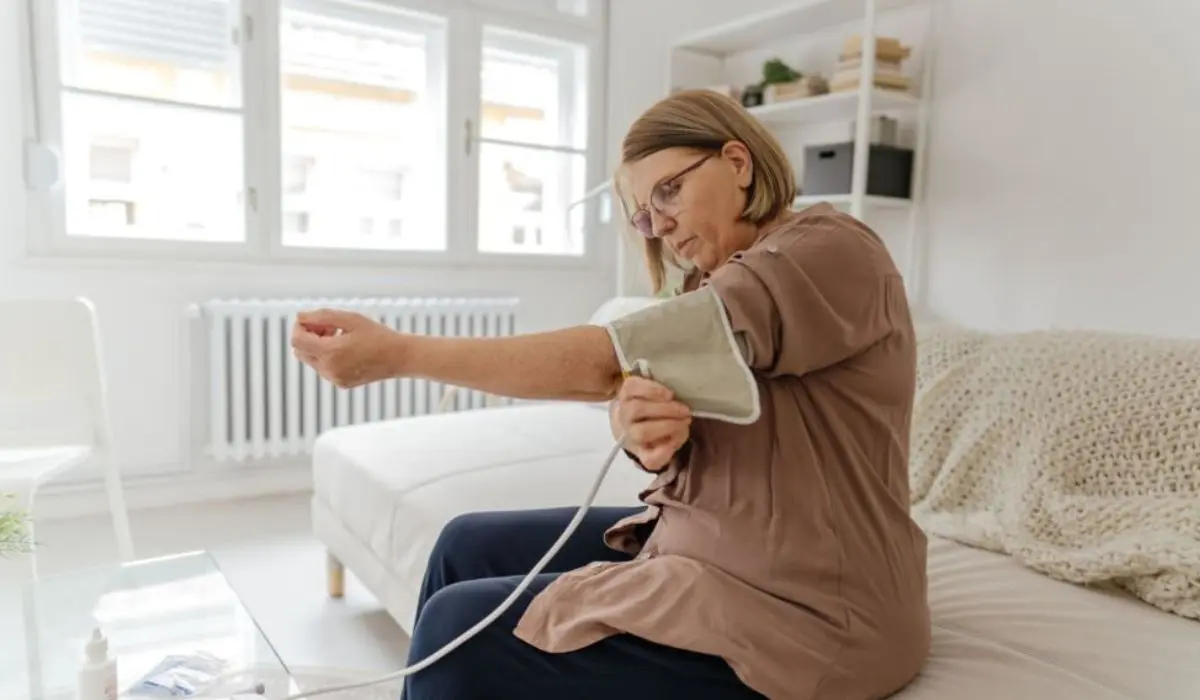If you routinely track your blood pressure, you may have noticed readings creep higher in the morning hours. Blood pressure dips during sleep and rises sharply upon waking – a phenomenon called the “morning blood pressure surge”.
In this article, we’ll dive into the science behind AM blood pressure spikes. You’ll learn what causes morning surges, associated health risks, strategies to lower morning blood pressure, and when to seek medical advice.
Let’s explore why blood pressure has an intriguing circadian rhythm.
What Is The Morning Blood Pressure Surge?
During a normal night’s rest, your blood pressure drops by 10-20%. This dip is associated with restorative sleep phases.

Upon waking and rising, everyone experiences a quick elevation in blood pressure due to the activation of the sympathetic nervous system. But in some, this surge is exaggerated to an abnormal degree.
The early morning blood pressure surge is defined as:
➜ Increase in BP exceeding 55 mmHg from nighttime lows
➜ Rise in BP exceeding 135/85 mmHg on awakening
➜ Elevation in BP sustaining for hours after waking
This steep morning spike stresses blood vessels and raises cardiovascular risk if sustained. Now let’s explore what’s behind these sunrise surges.
What Causes The Morning BP Surge?
Here are the key factors contributing to exaggerated morning blood pressure spikes:
- Circadian rhythm – Internal 24-hour cycles regulate BP.
- Hormones – Melatonin, cortisol, endothelin, and RAAS hormones flux with sleep-wake cycles, elevating BP.
- Sympathetic arousal – The sympathetic nervous system activates upon waking to energize you.
- Sleep apnea – Interrupted breathing stresses blood vessels.
- Insulin resistance – Associated with abnormal nighttime dipping and next-day spikes.
- Kidney function – Overnight fluid retention raises morning BP.
- Pain – Conditions like arthritis worsen in the morning.
- Stress – Anticipating the day can quicken pulse and BP.
Understanding contributors helps strategize lifestyle interventions to smooth out circadian peaks and valleys.
Associated Health Risks
Studies clearly demonstrate that higher morning blood pressure spikes correlate with:
➜ Increased left ventricular hypertrophy – thickened heart muscle
➜ Arterial stiffness resulting in isolated systolic hypertension
➜ Higher incidence of ischemic stroke in morning hours
➜ Greater risk of atherosclerosis and plaque rupture
➜ More heart attacks linked to the morning BP surge
➜ Higher cardiovascular and all-cause mortality
Controlling AM blood pressure extremes thus has real impacts on health outcomes.
Related: Best Salt Substitutes For High Blood Pressure: Take Control Of Your Health
Tips To Reduce Morning Blood Pressure
Here are some ways to gently bring down your morning blood pressure:
– rise slowly with light activity like gentle stretching
– avoid caffeine, nicotine, and cold meds in early AM
– write down stresses and tackle items on your to-do list the night before
– exercise in the evening to lower the next-day morning BP
– follow an anti-inflammatory diet rich in magnesium, potassium, and omega-3s
– ensure adequate sleep and sleep apnea treatment
– stay hydrated upon waking to prevent exaggerating surge
– home monitor morning BP to determine the effectiveness of interventions
– consider adding a low-dose aspirin if approved by your doctor
With a few lifestyle adjustments tailored to your needs, you can smooth out steep peaks for better BP stability.
How To Check For Morning Hypertension?
Follow this routine to accurately check for problematic AM blood pressure:
1. Take BP upon waking, before getting out of bed.
2. Sit quietly and rest your arm for 5 minutes.
3. Avoid tobacco, caffeine, exercise, or anxiety-producing thoughts beforehand.
4. Take 2-3 readings 5 minutes apart in the same arm to determine average.
5. Note readings in BP log to identify trends over weeks.
6. Check BP again mid-morning to see if it remains elevated.
7. Make dietary and lifestyle adjustments as needed.
8. Discuss findings with your doctor. You may need BP medication dosing adjusted.
Repeat this routine for 3 days to confirm a consistent morning spike above normal.
When To Seek Medical Advice?
Consult your doctor promptly about elevated morning blood pressure if:
– Morning surges repeatedly exceed 140/90 mmHg
– Your morning BP remains above 135/85 mmHg for over 3 hours after waking
– You experience morning high BP along with pounding heart, headache, or nosebleeds
– You have risk factors like sleep apnea, diabetes, or chronic kidney disease
– You have suspected or confirmed coronary artery disease or heart failure
– Your current medications don’t adequately control morning spikes
Managing morning hypertension helps safeguard your cardiovascular health long-term.
FAQs
Orthostatic hypotension causes temporary dizziness upon standing from lying down. Dehydration, medications, or dysautonomia may play a role.
Not necessarily, as BP normally runs higher upon waking. But sustained levels above 135/85 warrant evaluation
Yes, your morning surge is exaggerated if your BP spikes more than 55 points from your nighttime dip.
It peaks in mornings within 1-2 hours of waking, then gradually lowers again in late afternoon and night.
Discuss options with your doctor first. You likely need doses adjusted or longer-acting medication at night.

